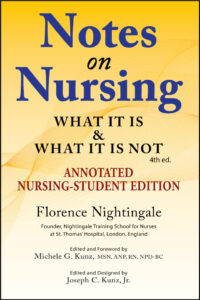Subtitle
Timeless Tips from Florence Nightingale’s ‘Notes on Nursing’ for New Nurses
Synopsis
Florence Nightingale’s “Notes on Nursing: What It Is and What It Is Not,” written in 1859, remains a foundational text that offers timeless wisdom for new nurses. This article explores how Nightingale’s principles of hygiene, observation, compassion, and advocacy can guide new nurses in building a solid foundation for their careers. By integrating these core concepts into modern practice, new nurses can enhance patient care, foster professional growth, and honor Nightingale’s enduring legacy.

Introduction: Embracing Nightingale’s Timeless Wisdom
1. Florence Nightingale’s Enduring Influence
Florence Nightingale, often considered the founder of modern nursing, wrote “Notes on Nursing: What It Is and What It Is Not” in 1859. This pioneering work laid the groundwork for nursing as a profession. Nightingale’s innovative practices and observations revolutionized patient care in her time and established enduring principles that continue to guide nursing practice today.
Nightingale’s approach to nursing was holistic and comprehensive, focusing on the importance of cleanliness, proper ventilation, nutrition, and compassionate care. Her work during the Crimean War demonstrated the life-saving impact of these principles, significantly reducing mortality rates and setting new standards for patient care. Her legacy continues to inspire and inform nursing practices worldwide.
2. Navigating Modern Nursing Challenges
Nightingale’s timeless principles offer invaluable guidance for new nurses embarking on their careers. These foundational concepts are more relevant than ever in today’s high-tech and fast-paced healthcare environment. Nightingale’s insights provide a framework to navigate the complexities of nursing with confidence and compassion, ensuring that new nurses can deliver high-quality, patient-centered care.
The rapid advancements in medical technology and the increasing complexity of healthcare systems can be overwhelming for new nurses. Nightingale’s principles serve as a stable anchor, helping new nurses to focus on the core aspects of patient care that genuinely make a difference. By adhering to these guidelines, new nurses can maintain a high standard of care while adapting to the ever-evolving healthcare landscape.
3. Building a Solid Foundation
This article explores how Nightingale’s wisdom can help you, as a new nurse, build a strong foundation for your practice. By grounding your work in the basics of hygiene, ventilation, nutrition, and compassion, you can develop the skills and confidence needed to thrive in the nursing profession. Nightingale’s principles are historical concepts and practical guidelines essential for modern nursing.
By integrating these foundational principles into your daily practice, you can ensure that you are providing comprehensive and effective care. Understanding the importance of hygiene helps prevent infections and promote healing. Ensuring proper ventilation can reduce the spread of diseases and enhance patient recovery. Providing adequate nutrition supports patient recovery and overall health. Lastly, compassionately treating patients fosters trust and improves care outcomes.
By grounding your practice in these timeless basics, you can build a strong foundation that supports your growth and confidence as a nurse. Nightingale’s principles are not just historical concepts but practical guidelines that can help you navigate the complexities of modern nursing with a patient-centered approach. Embracing these principles will enhance your clinical skills and ensure that you provide compassionate and effective care, ultimately leading to improved patient outcomes and a more fulfilling nursing career.
A. The Bedrock of Nursing Principles
Florence Nightingale emphasized fundamental principles that remain crucial in nursing today: hygiene, proper ventilation, nutrition, and compassion. As a new nurse, grounding your practice in these basics will provide a solid foundation for growth and development.
1. Hygiene
Maintaining cleanliness is essential to prevent infections and promote healing. Nightingale revolutionized nursing by introducing rigorous hygiene practices, significantly reducing mortality rates during the Crimean War. As a new nurse, understanding and implementing these practices can prevent infections and improve patient outcomes. This involves personal hygiene, such as regular handwashing, and maintaining clean, sterile environments in patient care areas.
2. Ventilation
Proper airflow in patient areas helps prevent the spread of diseases. Nightingale observed that well-ventilated spaces could reduce the transmission of airborne pathogens and enhance patient recovery. As a new nurse, you can ensure that patient rooms are well-ventilated and free from harmful pollutants, which can significantly impact patient health and recovery times.
3. Nutrition
Ensuring patients receive adequate nutrition supports their recovery. Nightingale emphasized the importance of providing patients with nutritious food to aid in their healing processes. As a new nurse, collaborating with dietitians to ensure patients receive balanced meals can play a crucial role in their recovery.
4. Compassion
Treating patients with empathy and kindness fosters trust and comfort. Nightingale’s compassionate approach to nursing emphasized understanding patients’ emotional and psychological needs. Building solid and empathetic relationships with patients can lead to better care outcomes and more meaningful patient interactions.
By grounding your practice in these timeless basics, you can build a strong foundation that supports your growth and confidence as a nurse. Nightingale’s principles are not just historical concepts but practical guidelines that can help you navigate the complexities of modern nursing with a patient-centered approach.
B. Emphasis on Hygiene and Environmental Health
Nightingale’s focus on hygiene and environmental health is a cornerstone of effective nursing care. Her pioneering work highlighted the critical role that a clean and healthy environment plays in patient recovery and overall health outcomes. These principles are just as relevant and vital in today’s healthcare setting. For new nurses, understanding and implementing these foundational concepts can significantly enhance the quality of care provided.
Maintaining high standards of hygiene and a clean environment is essential in preventing hospital-acquired infections and ensuring a safe setting for patients and healthcare workers. Nightingale’s insights into environmental health laid the groundwork for modern infection control practices, making her contributions indispensable to contemporary nursing practice.
1. Cleanliness
Regular handwashing and sterilization of equipment reduce the risk of infections. Nightingale’s insistence on cleanliness transformed patient care by drastically decreasing infection rates. As a new nurse, you must adopt strict hygiene practices, such as regular handwashing, using personal protective equipment (PPE), and sterilizing medical instruments to prevent the spread of infections.
2. Environment
Keeping patient areas clean and well-ventilated promotes a healthy recovery environment. Nightingale believed that a clean environment was critical to patient recovery. As a new nurse, ensuring that patient rooms are tidy, well-ventilated, and clutter-free can create a therapeutic environment that supports healing.
3. Practical Tips
Implementing daily cleaning routines and monitoring environmental conditions can make a significant difference. Nightingale’s approach to environmental health included practical steps such as regular cleaning schedules, ensuring adequate ventilation, and monitoring for potential health hazards. As a new nurse, developing and adhering to these routines can significantly enhance patient care quality.
Understanding the impact of a clean, well-ventilated environment on patient recovery is critical. These principles can guide your day-to-day actions and decisions, ensuring you contribute to a safe and healing environment for your patients. Internalizing these practices can help create a safer healthcare setting, prioritizing patient health and well-being. Embracing Nightingale’s focus on hygiene and environmental health will improve patient outcomes and enhance your effectiveness and professionalism as a nurse.
C. The Art of Observation
Developing keen observational skills is vital for new nurses. Nightingale believed that careful observation could provide critical information about a patient’s condition. In the fast-paced world of modern healthcare, where technology often takes center stage, the human element of careful observation remains indispensable. Observational skills allow nurses to detect early signs of potential health issues, ensuring timely and effective interventions.
Mastering the art of observation requires clinical knowledge and an intuitive understanding of patient behaviors and subtle changes in their condition. These skills are honed over time through practice and continuous learning, and they are essential for providing high-quality, patient-centered care.
1. Subtle Signs
Learning to notice minor changes in a patient’s appearance or behavior can lead to early interventions. Nightingale’s observations often revealed early signs of deterioration that could be addressed promptly. As a new nurse, developing the ability to detect subtle changes, such as slight skin color variations, respiration changes, or mood shifts, can enable timely interventions that improve patient outcomes.
2. Engagement
Engaging with patients and asking the right questions helps gather valuable insights into their well-being. Nightingale’s approach included actively engaging with patients to understand their conditions better. As a new nurse, asking open-ended questions and listening attentively to patient concerns can provide valuable insights into their health status and help build a comprehensive care plan.
3. Practice
Regularly practicing these skills will enhance your ability to provide high-quality care. Nightingale’s emphasis on continuous learning and practice is essential for developing strong observational skills. As a new nurse, committing to ongoing practice and reflecting on your observations can enhance clinical judgment and improve patient care quality.
Learning to observe not just the apparent symptoms but also the subtle cues that patients exhibit can significantly impact patient outcomes. Nightingale’s teachings encourage new nurses to look beyond the charts and engage with patients personally, fostering a deeper understanding of their needs.
This can help you catch early signs of complications or improvements, making you a more effective caregiver. By prioritizing observation, you can build strong assessment skills that will serve you throughout your career. Embracing Nightingale’s approach to observation will enhance your clinical abilities and ensure that your patient care is thorough and attentive.
D. Compassion and Empathy in Nursing
Nightingale’s dedication to compassionate care set a high standard for nursing. Her approach to nursing was not solely focused on physical healing but also on addressing patients’ emotional and psychological well-being. In an era where medical technology continues to advance, the timeless value of empathy and compassion in nursing cannot be overstated. For new nurses, integrating these qualities into everyday practice is crucial for providing holistic and patient-centered care.
Nightingale’s commitment to understanding and addressing the whole person—body, mind, and spirit—continues to inspire nurses today. By fostering a compassionate approach, nurses can build stronger connections with their patients, leading to better outcomes and a more fulfilling career.
1. Holistic Care
Treating patients with empathy addresses their emotional and psychological needs, not just physical ailments. Nightingale’s holistic approach emphasized the importance of addressing all aspects of a patient’s well-being. As a new nurse, recognizing the emotional and psychological dimensions of patient care can lead to more comprehensive and effective treatment plans.
2. Connection
Building a rapport with patients makes them feel valued and understood. Nightingale’s compassionate care created strong bonds with her patients. As a new nurse, building trust and rapport with patients can improve communication, foster a sense of security, and enhance overall care quality.
3. Fulfillment
Providing compassionate care leads to more meaningful and satisfying patient interactions. Nightingale found deep fulfillment in her empathetic approach to nursing. As a new nurse, practicing compassion can enrich your professional experience, making your work more rewarding and impactful.
As a new nurse, it’s essential to remember that nursing is not just about procedures and medications but about caring for the whole person. Nightingale’s dedication to her patients exemplifies the importance of empathy and compassion in nursing. You can create a supportive environment that fosters healing and trust by approaching patient care with genuine empathy.
This holistic approach benefits your patients and enriches your professional experience, making your work more rewarding and impactful. Embracing Nightingale’s principles of compassion and empathy ensures that your nursing practice is deeply rooted in understanding and caring for the complete well-being of your patients.
E. Advocacy and Leadership
Even as a new nurse, you have the potential to advocate for your patients and contribute to positive changes in healthcare. Nightingale’s legacy demonstrates that advocacy and leadership are integral to nursing, regardless of experience level. By actively participating in advocacy and leadership roles, new nurses can help shape the future of healthcare and ensure that patient care standards continue to improve.
Nightingale’s work shows that advocacy can significantly improve patient outcomes and healthcare practices. As new nurses, embracing these roles not only enhances your professional development but also makes a lasting impact on your patients and the healthcare system.
1. Patient Advocacy
Speaking up for your patient’s needs and rights is crucial in nursing. Nightingale’s advocacy for her patients’ well-being often led to significant improvements in their care. As a new nurse, learning to advocate effectively for your patients can ensure they receive the best care and support.
2. Healthcare Improvement
Suggesting improvements in practices and procedures can enhance the overall quality of care. Nightingale’s reforms in nursing practices were driven by her observations and advocacy. As a new nurse, your fresh perspective can identify areas for improvement in your workplace, contributing to better healthcare outcomes.
3. Leadership Development
Taking the initiative in your role can pave the way for future leadership opportunities. Nightingale’s leadership in nursing set a precedent for future generations. As a new nurse, demonstrating initiative and leadership in your daily tasks can open doors to advanced roles and responsibilities within the healthcare system.
Understanding that one voice can drive significant change can empower and encourage proactive engagement in your work environment. Nightingale’s legacy of advocacy highlights the importance of speaking up for patient needs and systemic improvements. As a new nurse, embracing this role can help you make meaningful contributions to your workplace and the broader healthcare community.
By advocating for your patients and the profession, you can drive positive change and enhance the quality of care. Recognizing the power of your advocacy and leadership can inspire you to take active roles in policy-making, patient care standards, and healthcare innovations, ensuring a progressive and effective nursing practice.
Conclusion: Embracing Nightingale’s Legacy for a Fulfilling Nursing Career
1. Building a Strong Foundation
Starting a career in nursing can be daunting, but Florence Nightingale’s “Notes on Nursing” offers timeless wisdom that can guide you through the challenges. By embracing her principles of hygiene, observation, compassion, and advocacy, you can build a strong foundation for a successful and fulfilling nursing career. These foundational principles provide a stable framework for developing your nursing skills and confidence.
2. Integrating Timeless Wisdom into Modern Practice
Nightingale’s insights are not just historical concepts but practical guidelines that remain relevant in today’s healthcare environment. Dedicating time to explore and integrate these principles into your daily practice ensures you deliver high-quality, patient-centered care. Whether maintaining rigorous hygiene standards, developing keen observational skills, or practicing empathy and compassion, Nightingale’s teachings can enhance every aspect of your nursing practice.
3. Honoring Her Legacy
By integrating Nightingale’s principles into your practice, you honor her legacy and contribute to the ongoing evolution of the nursing profession. Her holistic approach and dedication to patient care are a powerful reminder of the impact that one nurse can make. Embracing these values helps ensure that her pioneering spirit continues to inspire and guide new generations of nurses.
4. Advancing Your Professional Journey
Starting your career with Nightingale’s wisdom sets you on a path of continuous growth and professional development. Her emphasis on lifelong learning, leadership, and advocacy encourages you to strive for excellence and make meaningful contributions to your workplace and the broader healthcare community. As you advance in your career, these principles will serve as a beacon, guiding you through the complexities and challenges of modern nursing.
You honor her legacy while advancing your professional journey by dedicating time to exploring and integrating Nightingale’s insights into your daily practice. Florence Nightingale’s “Notes on Nursing” provides invaluable guidance that helps you confidently and purposefully navigate the early stages of your career, ensuring a rewarding and impactful nursing career.
Believe in the healing power of your care. Your skills and empathy create a powerful force that helps patients recover and find hope. -MK



